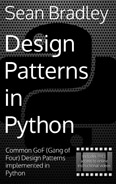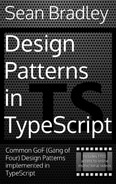Abstract Factory Design Pattern
Video Lecture
Overview
The Abstract Factory Pattern adds an abstraction layer over multiple other creational
pattern implementations.
To begin with, in simple terms, think if it as a Factory that can return Factories.
Although you will find examples of it also being used to return Builder, Prototypes,
Singletons or other design pattern implementations.
Terminology
-
Client: The client application that calls the Abstract Factory. It's the same
process as the Concrete Creator in the Factory design
pattern.
-
Abstract Factory: A common interface over all the sub factories.
-
Concrete Factory: The sub factory of the Abstract Factory and contains
method(s) to allow creating the Concrete Product.
-
Abstract Product: The interface and/or abstraction for the product that the sub factory returns.
-
Concrete Product: The object that is finally returned.
Abstract Factory UML Diagram

Source Code
./src/abstract-factory/abstract-factory-concept.ts
1
2
3
4
5
6
7
8
9
10
11
12
13
14
15
16
17
18
19
20
21
22
23
24
25
26
27
28
29
30 | // Abstract Factory Concept Sample Code
import { FactoryA, IProductA } from './factory-a'
import { FactoryB, IProductB } from './factory-b'
interface IProduct extends IProductA, IProductB {}
class AbstractFactory {
// The Abstract Factory Concrete Class
static createObject(factory: string): IProduct | undefined {
try {
if (['aa', 'ab', 'ac'].indexOf(factory) > -1) {
return FactoryA.getObject(factory[1])
}
if (['ba', 'bb', 'bc'].indexOf(factory) > -1) {
return FactoryB.getObject(factory[1])
}
throw new Error('No Factory Found')
} catch (e) {
console.log(e)
}
}
}
// The Client
let PRODUCT = AbstractFactory.createObject('ab')
console.log(PRODUCT)
PRODUCT = AbstractFactory.createObject('bc')
console.log(PRODUCT)
|
./src/abstract-factory/factory-a.ts
1
2
3
4
5
6
7
8
9
10
11
12
13
14
15
16
17
18
19
20
21
22
23
24
25
26
27
28
29
30
31
32
33
34
35
36
37
38
39
40
41
42
43
44
45
46
47
48
49 | // FactoryA Sample Code
export interface IProductA {
name: string
}
class ConcreteProduct implements IProductA {
name = ''
}
class ConcreteProductA extends ConcreteProduct {
constructor() {
super()
this.name = 'FactoryA:ConcreteProductA'
}
}
class ConcreteProductB extends ConcreteProduct {
constructor() {
super()
this.name = 'FactoryA:ConcreteProductB'
}
}
class ConcreteProductC extends ConcreteProduct {
constructor() {
super()
this.name = 'FactoryA:ConcreteProductC'
}
}
export class FactoryA {
static getObject(some_property: string): IProductA {
try {
if (some_property === 'a') {
return new ConcreteProductA()
} else if (some_property === 'b') {
return new ConcreteProductB()
} else if (some_property === 'c') {
return new ConcreteProductC()
} else {
throw new Error('Class Not Found')
}
} catch (e) {
console.log(e)
}
return new ConcreteProduct()
}
}
|
./src/abstract-factory/factory-b.ts
1
2
3
4
5
6
7
8
9
10
11
12
13
14
15
16
17
18
19
20
21
22
23
24
25
26
27
28
29
30
31
32
33
34
35
36
37
38
39
40
41
42
43
44
45
46
47
48
49 | // FactoryB Sample Code
export interface IProductB {
name: string
}
class ConcreteProduct implements IProductB {
name = ''
}
class ConcreteProductA extends ConcreteProduct {
constructor() {
super()
this.name = 'FactoryB:ConcreteProductA'
}
}
class ConcreteProductB extends ConcreteProduct {
constructor() {
super()
this.name = 'FactoryB:ConcreteProductB'
}
}
class ConcreteProductC extends ConcreteProduct {
constructor() {
super()
this.name = 'FactoryB:ConcreteProductC'
}
}
export class FactoryB {
static getObject(some_property: string): IProductB {
try {
if (some_property === 'a') {
return new ConcreteProductA()
} else if (some_property === 'b') {
return new ConcreteProductB()
} else if (some_property === 'c') {
return new ConcreteProductC()
} else {
throw new Error('Class Not Found')
}
} catch (e) {
console.log(e)
}
return new ConcreteProduct()
}
}
|
Output
node ./dist/abstract-factory/abstract-factory-concept.js
ConcreteProductB { name: 'FactoryA:ConcreteProductB' }
ConcreteProductC { name: 'FactoryB:ConcreteProductC' }
SBCODE Editor
Abstract Factory Example Use Case
An example use case may be that you have a furniture shopfront. You sell many kinds of furniture. You sell chairs and tables. And they are manufactured at different factories using different unrelated processes that are not important for your concern. You only need the factory to deliver.
You can create an extra module called FurnitureFactory, to handle the chair and table factories, thus removing the implementation details from the client.
Abstract Factory Example UML Diagram
See this UML diagram of an Abstract Furniture Factory implementation that returns chairs and tables.

Source Code
./src/abstract-factory/client.ts
| // Abstract Factory Use Case Example Code
import FurnitureFactory from './furniture-factory'
let FURNITURE = FurnitureFactory.getFurniture('SmallChair')
console.log(FURNITURE?.name)
console.log(FURNITURE?.getDimensions())
FURNITURE = FurnitureFactory.getFurniture('MediumTable')
console.log(FURNITURE?.name)
console.log(FURNITURE?.getDimensions())
|
./src/abstract-factory/dimension.ts
| export type dimension = {
height: number
width: number
depth: number
}
|
./src/abstract-factory/furniture-factory.ts
1
2
3
4
5
6
7
8
9
10
11
12
13
14
15
16
17
18
19
20
21
22
23
24
25
26
27
28
29
30
31
32 | // Abstract Furniture Factory
import { IChair } from './chair'
import ChairFactory from './chair-factory'
import { ITable } from './table'
import TableFactory from './table-factory'
interface IFurniture extends IChair, ITable {}
export default class FurnitureFactory {
static getFurniture(furniture: string): IFurniture | undefined {
try {
if (
['SmallChair', 'MediumChair', 'BigChair'].indexOf(
furniture
) > -1
) {
return ChairFactory.getChair(furniture)
}
if (
['SmallTable', 'MediumTable', 'BigTable'].indexOf(
furniture
) > -1
) {
return TableFactory.getTable(furniture)
}
throw new Error('No Factory Found')
} catch (e) {
console.log(e)
}
}
}
|
./src/abstract-factory/chair-factory.ts
1
2
3
4
5
6
7
8
9
10
11
12
13
14
15
16
17
18 | import SmallChair from './small-chair'
import MediumChair from './medium-chair'
import BigChair from './big-chair'
import { IChair } from './chair'
export default class ChairFactory {
static getChair(chair: string): IChair {
if (chair == 'BigChair') {
return new BigChair()
} else if (chair == 'MediumChair') {
return new MediumChair()
} else if (chair == 'SmallChair') {
return new SmallChair()
} else {
throw new Error('No Chair Found')
}
}
}
|
./src/abstract-factory/chair.ts
1
2
3
4
5
6
7
8
9
10
11
12
13
14
15
16
17
18
19
20
21
22
23
24
25 | import { dimension } from './dimension'
export interface IChair {
name: string
height: number
width: number
depth: number
getDimensions(): dimension
}
export class Chair implements IChair {
name = ''
height = 0
width = 0
depth = 0
getDimensions(): dimension {
return {
width: this.width,
depth: this.depth,
height: this.height,
}
}
}
|
./src/abstract-factory/small-chair.ts
| import { Chair } from './chair'
export default class SmallChair extends Chair {
constructor() {
super()
this.name = 'SmallChair'
this.height = 40
this.width = 40
this.depth = 40
}
}
|
./src/abstract-factory/medium-chair.ts
| import { Chair } from './chair'
export default class MediumChair extends Chair {
constructor() {
super()
this.name = 'MediumChair'
this.height = 60
this.width = 60
this.depth = 60
}
}
|
./src/abstract-factory/big-chair.ts
| import { Chair } from './chair'
export default class BigChair extends Chair {
constructor() {
super()
this.name = 'BigChair'
this.height = 80
this.width = 80
this.depth = 80
}
}
|
./src/abstract-factory/table-factory.ts
1
2
3
4
5
6
7
8
9
10
11
12
13
14
15
16
17
18 | import SmallTable from './small-table'
import MediumTable from './medium-table'
import BigTable from './big-table'
import { ITable } from './table'
export default class TableFactory {
static getTable(table: string): ITable {
if (table === 'BigTable') {
return new BigTable()
} else if (table === 'MediumTable') {
return new MediumTable()
} else if (table === 'SmallTable') {
return new SmallTable()
} else {
throw new Error('No Table Found')
}
}
}
|
./src/abstract-factory/table.ts
1
2
3
4
5
6
7
8
9
10
11
12
13
14
15
16
17
18
19
20
21
22
23
24
25 | import { dimension } from './dimension'
export interface ITable {
name: string
height: number
width: number
depth: number
getDimensions(): dimension
}
export class Table implements ITable {
name = ''
height = 0
width = 0
depth = 0
getDimensions(): dimension {
return {
width: this.width,
depth: this.depth,
height: this.height,
}
}
}
|
./src/abstract-factory/small-table.ts
| import { Table } from './table'
export default class SmallTable extends Table {
constructor() {
super()
this.name = 'SmallTable'
this.height = 40
this.width = 40
this.depth = 40
}
}
|
./src/abstract-factory/medium-table.ts
| import { Table } from './table'
export default class MediumTable extends Table {
constructor() {
super()
this.name = 'MediumTable'
this.height = 60
this.width = 60
this.depth = 60
}
}
|
./src/abstract-factory/big-table.ts
| import { Table } from './table'
export default class BigTable extends Table {
constructor() {
super()
this.name = 'BigTable'
this.height = 80
this.width = 80
this.depth = 80
}
}
|
Output
node ./dist/abstract-factory/client.js
SmallChair
{ width: 40, depth: 40, height: 40 }
MediumTable
{ width: 60, depth: 60, height: 60 }
SBCODE Editor
Summary
- Use when you want to provide a library of relatively similar products from multiple
different factories.
- You want the system to be independent of how the products are created.
- It fulfills all the same use cases as the Factory method, but is a factory for
creational pattern type methods.
- The client implements the abstract factory interface, rather than all the internal
logic and Factories. This allows the possibility of creating a library that can be
imported for using the Abstract Factory.
- The Abstract Factory defers the creation of the final products/objects to its concrete
factory subclasses.
- You want to enforce consistent interfaces across products.
- You want the possibility to exchange product families.




































